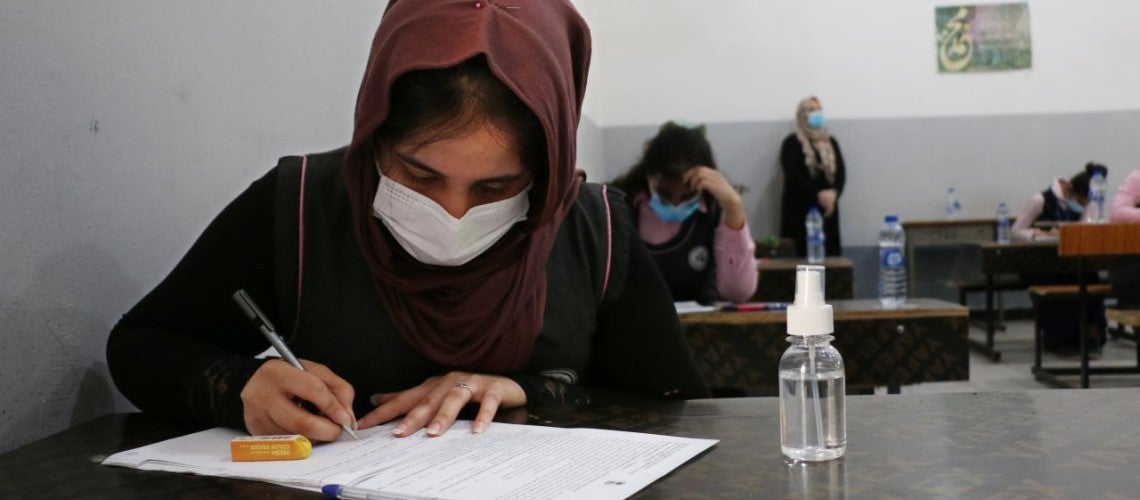 وتلخصت سنوات من الصراع بانعدام الكفاءة في النظام التعليمي في العراق مما أدى الى العجز عن توصيل المهارات الأساسية والتعليم المطلوب للنجاح في الحياة.
وتلخصت سنوات من الصراع بانعدام الكفاءة في النظام التعليمي في العراق مما أدى الى العجز عن توصيل المهارات الأساسية والتعليم المطلوب للنجاح في الحياة.
Amal was very excited to go to school in her small town in Al-Anbar governorate, until the day in February when COVID-19 led to school shutdowns across Iraq. The curious 6-year-old enjoyed learning how to read and write with her friends; because her school ran multiple shifts, it meant she only had a few hours a week to learn how to read the letters in her book, but she always listened carefully. Two weeks after finally learning to write her name (which means hope), COVID-19 began spreading through her village and Amal was sent home.
Her school kept its doors closed for the rest of the school year.
Over 11 million children have been affected by school closures in Iraq. Amal spends her days at home, cut-off from her friends at school and the learning she enjoyed. Although remote learning options are available, she isn’t always able to take advantage of them. In the rural area where she lives, internet connections are sparse, and she has to share a computer with her siblings. Her brother has been heavily using it to prepare for his final grade 12 exams that will determine which university he can attend, and, ultimately, his profession.
Even when Amal is able to get online, or to use class material her teacher sends by phone, her low level of literacy means she is often confused by the written format of her lessons.
Amal represents many children struggling amidst COVID-19 to attain the early literacy skills fundamental for learning and their educational pathway. Years of conflict and structural inefficiencies have resulted in an education system in Iraq that is not conveying the foundational skills and learning needed to succeed in life. An early grade reading assessment (EGRA) found the vast majority of Iraqi students in grades 2 and 3 did not comprehend age-appropriate materials.
A recent UNICEF survey found only around 75% of children in primary school and less than 50% in secondary school actually finished school.
Current school closures pose a threat to even more children dropping out of school, especially in rural areas and from the poorest households. Just like in many countries around the world, the crisis is likely to exacerbate inequalities in learning. Iraq’s Ministry of Education has provided learning through an online platform and television, but the focus has mostly been on students in higher grades sitting final exams. Inevitably, this also favors those children with access to technology.
Recent school closures will have lasting impacts on Amal’s future and that of her classmates, as well as on economic outcomes for Iraq as a whole. Even prior to COVID-19, Iraqi children lagged well behind their peers in human capital development measured by the World Bank’s Human Capital Index. A child born in Iraq today will reach, on average, only 41% of his or her potential productivity when he or she grows up. Of an average 7 years spent in school, the amount of learning that is taking place is only 4 years.
School closures will lead to even more "learning loss". The World Bank estimates that worldwide, the current school cohort stands to lose more than US$10 trillion in lifetime earnings as a result of lost learning. This could mean at least 5% less in yearly earnings, or about US$31 billion in lost lifetime earnings, for all students in Iraq.
The health crisis is affecting many sectors, so why should countries like Iraq focus on investments in education? Education is among the best fiscal stimulus expenditures in COVID-19 recovery packages. The link between skills attained in school and economic growth has long been established, and returns to investment in education are well above alternative investments for both — individuals and governments.
Iraq can use lessons from the current health crisis to turn recovery into an opportunity to build back better. More than ever, Iraq needs to protect learning for its poorest and most vulnerable children now. The World Bank proposes three phases for policy responses: (1) coping: an emergency education response that will keep kids safe while supporting continued learning; (2) managing continuity: as schools reopen, Iraq needs to ensure safe re-openings, that student dropout is minimized and learning recovery that restores education’s ability to build human capital starts; and, (3) improving and accelerating: taking advantage of new opportunities to build back educational systems stronger and more equitable than before.
Using innovative education delivery approaches are necessary to mitigate learning loss and build a resilient education system that ensures learning for all children in Iraq. ICT infrastructure is sparse, and access to it, highly unequal. Localized, community-based solutions to education service delivery is imperative to ensure learning for all. For example, using a blended approach for online and offline content delivery, can ensure the most vulnerable children have access to continued learning. Such support can leverage the most widely available ICT technology — mobile phones — which 99% of households have, while coaching caregivers on how to best support the learning of their children at home and continue doing so when schools reopen.
- The focus in primary schools should be on reading materials for students, and teaching materials and coaching for teachers to strengthen foundational literacy skills.
- In secondary education, innovative approaches could support self-learning for youth by making complementary, quality learning content available to students, while supporting learning and teaching of life and job relevant skills.
- Adequate safety nets, for example through cash transfer programs, should also be provided for the most vulnerable children to ensure those at a high risk of dropping out manage to progress through the education system.




Join the Conversation